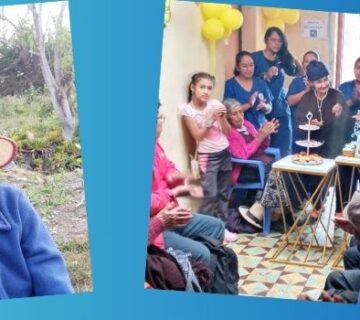We asked young members of the Focolare Movement from different countries to give us their own take on Pope Francis’ recent apostolic exhortation “Christus Vivit”. First we hear from Noemi Sanchez, protagonist at the preparatory meeting of the Synod of Catholic Bishops on Young People in 2018.
 Noemi (28) is from Paraguay, of Brazilian heritage, currently completing a research doctorate in Philosophy at the University of Perugia, Italy. In March 2018 she participated in the pre-synodal meeting convened by the Pope in order to listen to young people from all over the world and prepare the subsequent Synod on Youth with them and for them. The apostolic exhortation “Christus Vivit” is one of the outcomes of this intergenerational process. Many young people have already read it and spread it among their own groups and peers.
Noemi (28) is from Paraguay, of Brazilian heritage, currently completing a research doctorate in Philosophy at the University of Perugia, Italy. In March 2018 she participated in the pre-synodal meeting convened by the Pope in order to listen to young people from all over the world and prepare the subsequent Synod on Youth with them and for them. The apostolic exhortation “Christus Vivit” is one of the outcomes of this intergenerational process. Many young people have already read it and spread it among their own groups and peers.
– In this document, the Pope repeatedly stresses the need for the Church to listen to young people. Has this been happening?
I think the whole process around the Synod of October 2018 has been a clear example of the Church’s sincere desire to listen to us and welcome us wholeheartedly.
There were 300 of us at the pre-Synod, from many different countries. We were free to say whatever we thought, as the Pope himself invited us to do. The “adults” listened to us and encouraged dialogue with us. What matters now is that this two-way experience between generations should take place in different environments, in parishes and Christian communities.
– More than once, the Pope refers to the restlessness so characteristic of youth. Do you believe that it’s possible to listen to the voice of God in the midst of all the sounds, voices and digital stimuli which bombard us today?
 The Pope coins the phrase “flying on their two feet” because actually we young people are never really still, but always looking out for something. However, we also hit limits caused by our lack of experience, for example, or the fear of making a big mistake in any decisive choice. “High speed” is not enough, we also need meaning. Encouragement from being around the generations above us is always crucial to achieve this, and never more so than today with all its “false alarms”. Having experienced it for myself, I believe that the voice of God always makes itself heard through the “amplifiers” of love.
The Pope coins the phrase “flying on their two feet” because actually we young people are never really still, but always looking out for something. However, we also hit limits caused by our lack of experience, for example, or the fear of making a big mistake in any decisive choice. “High speed” is not enough, we also need meaning. Encouragement from being around the generations above us is always crucial to achieve this, and never more so than today with all its “false alarms”. Having experienced it for myself, I believe that the voice of God always makes itself heard through the “amplifiers” of love.
– Why do you think it is so few young people today want to embark upon a serious journey of faith? What’s lacking and what are they searching for?
I think there are many reasons for this: a growing disillusionment, ignorance or even laziness. Many of us don’t have a deep knowledge of the faith, and so we young people can become victims of the “rootless” society the Pope condemns all the time. At the same time, we feel a strong desire to get involved in social causes, there is a widespread sensitivity to the arts, as well as the desire to build lasting and meaningful relationships, to live authentically for something that gives meaning to our life, looking for authentic role models. I definitely think today’s youth are searching for God, it’s just they are not always aware of it.
– In your opinion, what is the real contribution the Synod on Youth and this apostolic exhortation are having on the life of the Church, and in particular on the young people in the Church?
This Synod has undoubtedly brought to light something new (a novum) in the history of the Church as regards methodology and its realistic approach. What came out most, I think, was inter-religious dialogue and how essential and enriching it is for the whole life of the Church.
The Exhortation is a real treasure for all young people, not only Catholics. When I read it, rather than a formal document of the Church, it seemed more like a long letter from your grandfather, or from an old friend who loves you and really knows how to get through to you. Someone who can tell you what you need in this particular moment of your life in order not to fall away but how to get up, and keep on trying again and again. To keep on believing in beauty, in good, in love, in the truest nature of humanity – which is also divine. To believe in the possibility of reaching full happiness whatever sufferings and problems are part of life. To learn how to overcome them with courage and commitment
edited by Stefania Tanesini


 Italiano
Italiano Español
Español Français
Français Português
Português




Encourageant et plein d’empathie, nos jeunes cherchent des témoins…soyons disposés à les écouter pour avancer et se sanctifier ensemble….UNITÉ
c’est tellement intéressant